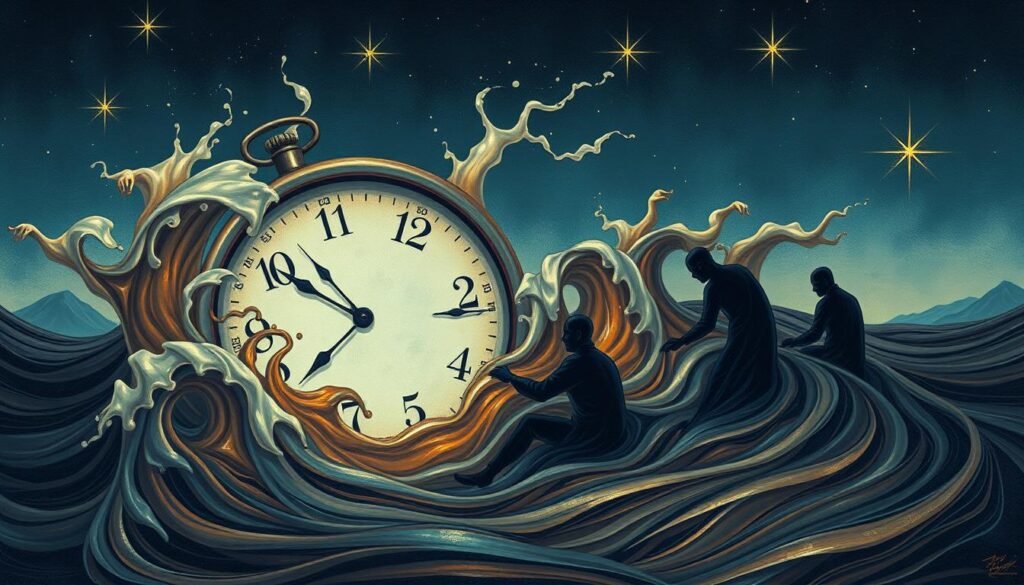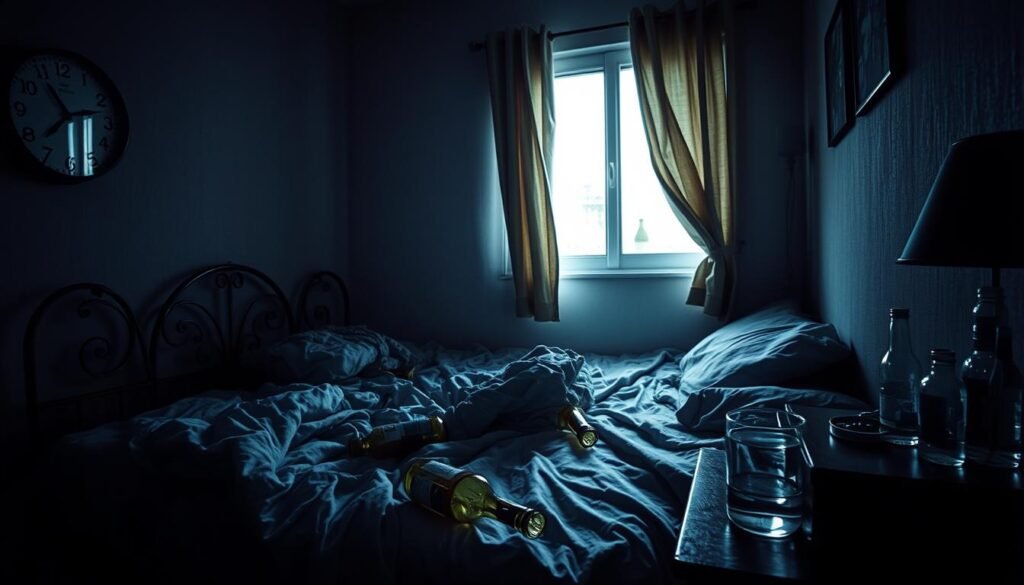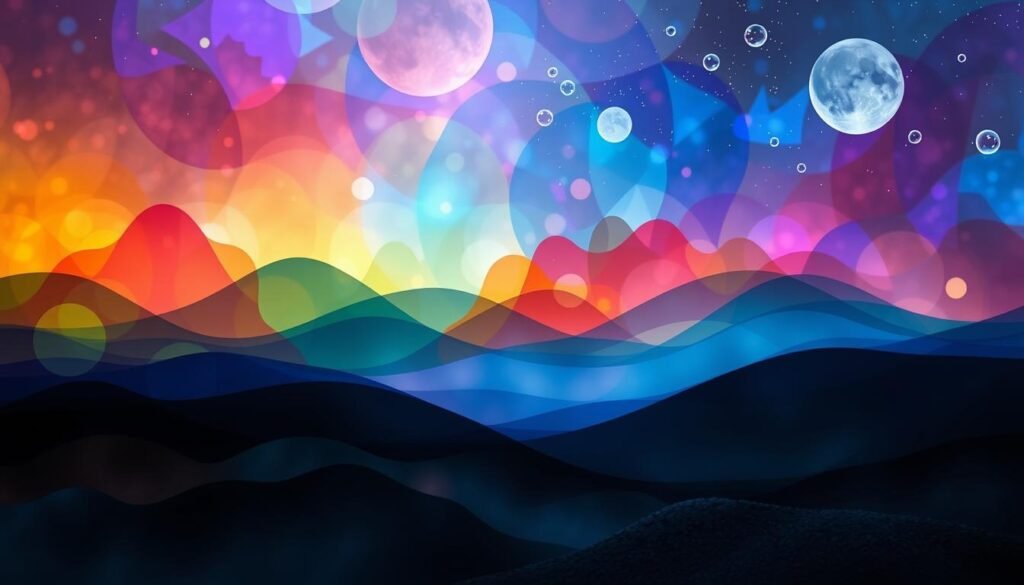Did you know about 20% of American adults say that alcohol messes with their sleep? This big number shows a major worry about alcohol’s effect on sleep. Many people might not know how much alcohol can impact their night’s rest. It changes the sleep quality and messes with important sleep stages. It’s key to understand how alcohol and sleep quality are linked. This link affects our overall health and well-being.
In this article, you’ll learn how alcohol affects sleep cycles and the factors behind it. We’ll look into how sleep patterns change and how circadian rhythms get disrupted. This will help show how people can better their sleep despite alcohol’s challenges.
Key Takeaways
- The impact of drinking on sleep stages varies among individuals.
- Alcohol consumption can lead to reduced sleep quality and restfulness.
- Changes in sleep architecture are directly linked to alcohol use.
- Understanding circadian rhythm disruptions can aid in sleep improvement.
- Alcohol-induced sleep disturbances are common but manageable.
Understanding Sleep Cycles
Sleep is key to good health. Sleep cycles are at the heart of a rejuvenating night. A full sleep cycle lasts about 90 minutes and goes through different stages.
It includes non-REM and REM sleep, each playing a special role. Non-REM sleep helps repair the body, and REM sleep boosts memory and handles emotions.
These stages happen over and over each night. They help us get the deep rest we need. A normal night includes many cycles, showing why steady, uninterrupted sleep matters.
Knowing about sleep cycles helps us see how things like drinking alcohol can disrupt sleep. It shows us how our choices can affect our sleep stages. This knowledge encourages better lifestyle choices for healthier sleep.
Effects of Alcohol on Sleep Cycles
Knowing how alcohol affects sleep is key for regular drinkers. At first, alcohol might make you feel sleepy. This makes people think they’re getting good sleep. But, alcohol actually messes up the sleep stages that help us recharge.
How Alcohol Disrupts Sleep Stages
Alcohol changes the way we move through sleep phases. It makes us fall asleep faster because of its calming effect. But, there’s a downside. As the night goes on, you might wake up often. This mostly ruins REM sleep, which helps with thinking and feelings. It also hurts deep sleep, needed for body repair. So, you might not feel rested after a full night’s sleep.
The Role of Sleep Architecture
Sleep architecture is how our sleep is built night by night. Alcohol messes with this structure, leading to lighter, shorter sleep. This makes it hard to get into deep sleep. Over time, drinking can make your sleep quality worse. You could end up feeling tired and unable to focus during the day. This shows why it’s important to know how alcohol affects sleep.
Alcohol and Sleep Quality
It’s key to know how alcohol affects our sleep. Drinking even a little can disturb your rest. It often causes people to wake up many times at night. This leads to feeling tired the next day.
Short-term Effects on Restfulness
Alcohol has immediate effects on sleep. Common issues include:
- Increased nighttime awakenings
- Reduced feelings of restfulness upon waking
- Interference with deep sleep stages
Alcohol messes with how we move through sleep stages. Drinking before bed can really lower sleep quality. Knowing this helps us make better choices at night. For more, see Sleep Foundation.
Long-term Consequences of Alcohol Use
Drinking a lot over time harms sleep quality. It can lead to sleep disorders like insomnia. Many studies show a strong connection between regular drinking and sleep problems. This can create a bad cycle of poor sleep and more drinking. To learn how alcohol affects anxiety and sleep, visit Mood Care.
Alcohol-Induced Sleep Disturbances
Drinking alcohol affects how well you sleep, leading to problems. People who drink might have more nightmares and wake up often during the night. This happens because alcohol changes the way we sleep and affects sleep stages.
Regular drinkers often feel restless and might have trouble breathing at night. This is because alcohol’s calming effects can also stop you from getting deep, healing sleep. These sleep problems vary from person to person, but they all hurt how well you do during the day.
Having these sleep problems for a long time can harm your mental and physical health. You might feel tired, think less clearly, and have mood issues due to changed sleep patterns. If you’re struggling with sleep issues from drinking, check out this detailed article to understand more.
| Sleep Disturbance | Description | Potential Impact |
|---|---|---|
| Nightmares | Frequent unpleasant dreams | Increased anxiety and poor sleep quality |
| Restlessness | Trouble remaining asleep | Daytime fatigue and irritability |
| Breathing Issues | Interrupted or shallow breathing during sleep | Higher risk of sleep apnea and related complications |
Impact of Drinking on Sleep Stages
It’s vital to understand how drinking changes our sleep. These changes can affect both REM and deep sleep. Both stages are necessary for our minds and bodies to fully recover.
Understanding REM Sleep Changes
Alcohol changes REM sleep, which is crucial for our brain. This stage helps in remembering things and handling feelings. But, drinking too much can hurt the quality of REM sleep.
This can lead to problems with memory and mood swings. People who drink before sleeping often lose valuable REM sleep. This harms their mental health. You can find out more about this here.
Effects on Deep Sleep Phases
Deep sleep helps our body heal and stay healthy. However, alcohol cuts down the time we spend in deep sleep. This can slow down muscle repair and recovery.
Because of less deep sleep, people may feel tired and perform poorly the next day. The impact of alcohol on deep sleep varies from person to person. That’s why it’s important to drink responsibly.
| Sleep Stage | Role in Health | Impact of Alcohol |
|---|---|---|
| REM Sleep | Cognitive processing and emotional regulation | Decreased duration and disrupted cycles |
| Deep Sleep | Physical restoration and recovery | Reduced time spent in deep phases |
Alcohol and Circadian Rhythm Disruption
The body’s circadian rhythms keep our sleep-wake cycles in check. They make sure we sleep and wake up at the right times. But, alcohol can mess with these rhythms, causing sleep problems.
Drinking alcohol, especially at night, can throw off our biological clocks. This leads to changing sleep patterns. People might find their sleep schedule shifting, affecting how rested and alert they feel during the day.
This isn’t just about feeling sleepy. It can change your mood, how you think, and your overall health. Over time, this can get worse, making it hard for the body to get back to its regular rhythm. This is bad for getting the deep sleep we need to recover physically and mentally.
To show how alcohol affects circadian rhythms, here’s a table:
| Aspect | Normal Circadian Function | Alcohol-Affected Patterns |
|---|---|---|
| Sleep Onset | Consistent and timely | Delayed and irregular |
| Sleep Duration | Optimal, restorative | Fragmented and insufficient |
| Awakening | Feel refreshed and alert | Groggy and lethargic |
| Overall Health (Mental and Physical) |
Stable and effective | Reduced, with potential long-term effects |

Understanding Alcoholic Sleep Apnea
Alcoholic sleep apnea is a serious condition where breathing stops and starts during sleep. It gets worse with alcohol use. People who drink a lot may snore loudly and breathe strangely. This messes up their sleep.
Common symptoms of this condition include:
- Severe snoring
- Periods of paused breathing
- Excessive daytime sleepiness
- Morning headaches
- Difficulty concentrating
Those with alcoholic sleep apnea face more than just bad sleep. They risk serious health problems, like heart issues. Drinking and sleep apnea together stress the heart. This can lead to big health problems over time.
It’s important to see the link between drinking and sleep apnea. Cutting back on alcohol can help sleep and lower health risks. Knowing the signs of this condition is key. It helps people get the treatment they need.
| Symptoms | Potential Risks |
|---|---|
| Severe Snoring | Cardiovascular Issues |
| Periods of Paused Breathing | High Blood Pressure |
| Excessive Daytime Sleepiness | Increased Fatigue |
| Morning Headaches | Decreased Cognitive Function |
| Difficulty Concentrating | Elevated Mood Disorders |
Hangover-Related Insomnia
When you drink too much, you may face hangover-related insomnia. This happens because hangover symptoms affect your sleep quality. At night, if you’re dehydrated after drinking, sleeping becomes hard.
Also, withdrawal symptoms make it worse. As your body gets rid of alcohol, you might feel restless all night. This lack of sleep can make you anxious and snappy, making rest even harder to find.

This can lead to a bad cycle. Poor sleep might make you drink more to feel better, keeping the insomnia going. Knowing about this cycle is key to breaking it and getting better sleep.
| Symptom | Impact on Sleep |
|---|---|
| Dehydration | Causes discomfort, leading to frequent awakenings |
| Withdrawal Symptoms | Creates restlessness and anxiety, making it hard to fall asleep |
| Fatigue | Increases the temptation to recourse to alcohol for relief |
| Poor Sleep Quality | Leads to increased alcohol consumption to cope with tiredness |
To tackle hangover-related insomnia, try a few things. Keep hydrated and watch how much you drink. These steps could make a big difference in your sleep quality and health.
Alcohol Withdrawal Insomnia
People trying to quit alcohol often face big sleep problems. Alcohol withdrawal insomnia means they can’t sleep well, making it harder to recover. The body struggles to get used to no alcohol, leading to a vicious cycle of insomnia.
The symptoms of alcohol withdrawal insomnia can be tough:
- Difficulty falling asleep
- Frequent awakenings during the night
- Unrefreshing sleep, even after a full night
- Increased anxiety and restlessness
Sleep issues can really mess up someone’s recovery. When you don’t sleep well, stress and emotional ups and downs get worse. This can make a person more likely to start drinking again. It’s super important to deal with these sleep problems for a successful recovery.
But there are ways to fight alcohol withdrawal insomnia:
- Establishing a regular sleep schedule
- Creating a restful sleeping environment
- Practicing relaxation techniques, such as meditation or deep breathing exercises
- Seeking professional guidance from healthcare providers
Using these tips can make your sleep better and help a lot in recovery. By understanding alcohol withdrawal insomnia, you can take charge of your health and your path to sobriety.
| Symptom | Description |
|---|---|
| Difficulty falling asleep | Struggling to initiate sleep after lying down at night. |
| Frequent awakenings | Waking up multiple times throughout the night, disrupting sleep continuity. |
| Unrefreshing sleep | Feeling tired upon waking, despite having spent hours in bed. |
| Increased anxiety | Heightened feelings of nervousness or panic, contributing to sleep issues. |
Ethanol’s Effect on Sleep Architecture
Ethanol is the main part of alcoholic drinks and it really affects how we sleep. It changes the stages of sleep and sleep quality. Studies show that drinking a lot of alcohol might not cut down total sleep time. But, it really messes with how good that sleep is, shaking up the balance of REM and non-REM sleep.
At the start of sleep, ethanol might make deep sleep stronger. This could seem like a good thing. Yet, this effect doesn’t stick around all night. As time goes on, there’s a rebound effect that can mess up sleep, making it choppy. This can make getting restorative sleep hard, which is key for feeling good overall.
A study looked at young people and how ethanol affected their sleep. It found they had less REM sleep, important for thinking clearly and feeling balanced emotionally. Less REM sleep can leave someone feeling dull and tired when they wake up.
The way ethanol impacts sleep differs from person to person. Age, how much someone can handle, and health play a big part in this. For a deeper look into this topic, you can check out a study here.

Conclusion
Alcohol affects sleep in many ways. It changes sleep stages and hurts sleep quality. It’s key to know how drinking influences rest after a long day.
Alcohol can cause sleep problems like insomnia and hangovers. It’s important to drink in moderation. Too much can harm your sleep health and daily life.
Be aware of how drinking affects your sleep. This knowledge can help improve your rest and well-being. For more information, visit anxiety after drinking alcohol.